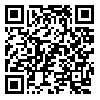Volume 9, Issue 4 (Autumn 2021)
PCP 2021, 9(4): 329-338 |
Back to browse issues page
Download citation:
BibTeX | RIS | EndNote | Medlars | ProCite | Reference Manager | RefWorks
Send citation to:



BibTeX | RIS | EndNote | Medlars | ProCite | Reference Manager | RefWorks
Send citation to:
Naeimijoo P, Masjedi Arani A, Bakhtiari M, Mohammadi Farsani G, Yousefi A. The Relationship Between Covid-related Psychological Distress and Perceived Stress With Emotional Eating in Iranian Adolescents: The Mediating Role of Emotion Dysregulation. PCP 2021; 9 (4) :329-338
URL: http://jpcp.uswr.ac.ir/article-1-792-en.html
URL: http://jpcp.uswr.ac.ir/article-1-792-en.html
Parastoo Naeimijoo1 

 , Abbas Masjedi Arani *2
, Abbas Masjedi Arani *2 

 , Maryam Bakhtiari1
, Maryam Bakhtiari1 

 , Gholamreza Mohammadi Farsani3
, Gholamreza Mohammadi Farsani3 

 , Ahmad Yousefi1
, Ahmad Yousefi1 




 , Abbas Masjedi Arani *2
, Abbas Masjedi Arani *2 

 , Maryam Bakhtiari1
, Maryam Bakhtiari1 

 , Gholamreza Mohammadi Farsani3
, Gholamreza Mohammadi Farsani3 

 , Ahmad Yousefi1
, Ahmad Yousefi1 


1- Department of Clinical Psychology, School of Medicine, Shahid Beheshti University of Medical Sciences, Tehran, Iran.
2- Department of Clinical Psychology, School of Medicine, Shahid Beheshti University of Medical Sciences, Tehran, Iran. ,dr.masjediarani@gmail.com
3- Department of Clinical Nutrition, School of Nutrition and Dietetics, Tehran University of Medical Sciences, Tehran, Iran.
2- Department of Clinical Psychology, School of Medicine, Shahid Beheshti University of Medical Sciences, Tehran, Iran. ,
3- Department of Clinical Nutrition, School of Nutrition and Dietetics, Tehran University of Medical Sciences, Tehran, Iran.
Abstract: (5098 Views)
Objective: The unprecedented nature of the COVID-19 pandemic and cessation of full face-to-face affiliation along with homebound restrictions have caused a variety of psychological distress among adolescents. Adolescents vary in the way they perceive such stressors and some respond with eating disturbances, which could reflect their dysfunctional emotion regulation strategies. The present research aimed at elucidating potential mediating pathways from perceived stress and psychological distress to emotional eating.
Methods: This cross-sectional study was composed of 292 adolescents who were assessed using the Perceived Stress Scale, COVID-19-Related Psychological Stress Scale, Emotional Eating subscale of the Dutch Eating Behavior Questionnaire, and Difficulties in Emotion Regulation Scale. Correlation analyses were performed to assess the relationship between variables. ANOVA was conducted to detect differences between males and females for emotional eating. Then, a mediation analysis was conducted to assess whether emotional dysregulation was a mediator between psychological distress and emotional eating.
Results: Results of path analyses indicated that a model with perceived stress and psychological distress predicting emotion eating through the mediation of emotion dysregulation was the best fit for the data (CFI=0.970, GFI=0.949, df=26, χ2=53.69, χ2/df=2.06, P>0.05, and RMSEA=0.069). Mediation analyses showed the mediating role of emotion dysregulation in the link between perceived stress and emotional eating (Sobel’s z=2.83, P<0.05) while, it could not function as a mediator between psychological distress and emotional eating (Sobel’s z=0.90, P>0.05).
Conclusion: This study contributes to our understanding of the role of emotion regulation in the relationship between perceived stress and psychological distress and emotional eating in adolescents during the COVID-19 pandemic. The implication of this study is for therapeutic intervention to target emotional dysregulation of adolescents confronted with COVID-19 stressors.
Methods: This cross-sectional study was composed of 292 adolescents who were assessed using the Perceived Stress Scale, COVID-19-Related Psychological Stress Scale, Emotional Eating subscale of the Dutch Eating Behavior Questionnaire, and Difficulties in Emotion Regulation Scale. Correlation analyses were performed to assess the relationship between variables. ANOVA was conducted to detect differences between males and females for emotional eating. Then, a mediation analysis was conducted to assess whether emotional dysregulation was a mediator between psychological distress and emotional eating.
Results: Results of path analyses indicated that a model with perceived stress and psychological distress predicting emotion eating through the mediation of emotion dysregulation was the best fit for the data (CFI=0.970, GFI=0.949, df=26, χ2=53.69, χ2/df=2.06, P>0.05, and RMSEA=0.069). Mediation analyses showed the mediating role of emotion dysregulation in the link between perceived stress and emotional eating (Sobel’s z=2.83, P<0.05) while, it could not function as a mediator between psychological distress and emotional eating (Sobel’s z=0.90, P>0.05).
Conclusion: This study contributes to our understanding of the role of emotion regulation in the relationship between perceived stress and psychological distress and emotional eating in adolescents during the COVID-19 pandemic. The implication of this study is for therapeutic intervention to target emotional dysregulation of adolescents confronted with COVID-19 stressors.
Keywords: Perceived stress, Psychological distress, Emotional eating, Emotion regulation, Adolescents
Type of Study: Original Research Article |
Subject:
Psychiatry
Received: 2021/04/10 | Accepted: 2021/08/8 | Published: 2021/10/1
Received: 2021/04/10 | Accepted: 2021/08/8 | Published: 2021/10/1
| Rights and permissions | |
 |
This work is licensed under a Creative Commons Attribution-NonCommercial 4.0 International License. |





